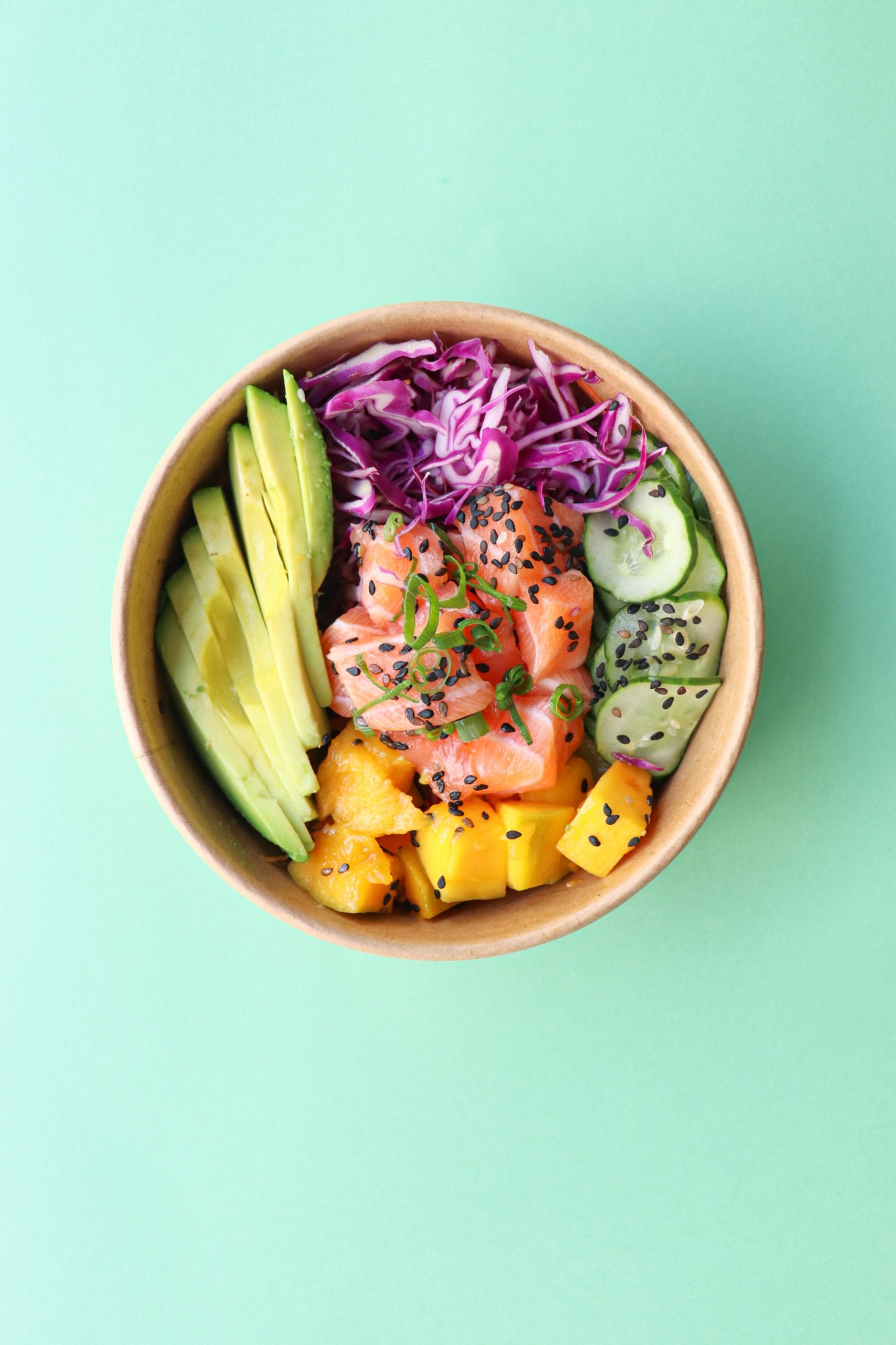
More than ½ of your plate (even better ¾) should be filled with plant-based foods, at every meal and ideally snacks (not just dinner). The more colours you consume daily the better. When it comes to colour, the brightest the better. Eating a rainbow of colours daily (red, orange, yellow, green, blue, purple) ensures sufficient intake of nutrients, beneficial phytochemicals and antioxidants.
A good diet is based on whole foods, as much as possible seasonal, topical and organic and minimal processed, packaged and ready-made foods. This means minimal intake of pesticides, antibiotics, hormones, GMOs, additives, preservatives, dyes, artificial sweeteners, and other chemicals or fake food-like ingredients. The above can create inflammation in the body, insulin spikes, weight gain, allergies and sensitivities, leaky gut, can affect brain chemistry and are carcinogenic.
Some healthy grains to eat are quinoa, buckwheat, amaranth (pseudo-grains, lower in carbs, gluten-free), millet, teff, sorghum, oats, brown/black rice (gluten-free) and rye, barley, spelt, sprouted wheat (if you are not gluten sensitive).
Grain flours increase blood sugar more than whole grains, so aim to eat mostly the later. Stick to ½ to one cup per meal to keep your blood sugar stable.
Wheat is mostly consumed in its processed form nowadays (white flour, white bread & pasta) and in hybridized versions, higher in gluten. Other gluten-containing grains like rye, barley and spelt contain less gluten and less inflammatory types of gluten and so are better tolerated. Moreover, wheat is often sprayed with toxic chemicals and are preserved with calcium propionate, which has been linked to behavioural issues, headaches and gastrointestinal inflammation.
Sometimes I say “unless you have a goat in your backyard, avoid dairy”. Dairy nowadays is very different to what it used to be. Animals are being treated in the worst ways (mass-production). Dairy today and especially cow’s milk has been linked to osteoporosis, all sort of digestive issues, atopic conditions and autoimmune disorders. It creates mucus and lowers the immune system.
Modern dairy cows have been hybridized to contain only A1 casein (a protein found in milk, goat contains A2 casein), which is more inflammatory and creates more digestive problems.
It is ok to consume grass-fed and organic goat’s and sheep’s (or even buffalo or camel) dairy on occasion (yoghurt, kefir, butter, ghee, aged cheese, such as parmesan) if you tolerate it.
Spikes in blood sugar with subsequent insulin highs leads to inflammation. Chronic sugar consumption leads to inflammatory diseases such as obesity, diabetes, metabolic syndrome, autoimmune disease, neurodegenerative diseases, cancer, infertility, cardiovascular disease and more.
Refined and simple sugars, such as white flour, fruit juices, high-fructose corn syrup and other syrups, table sugar, desserts, milk, candy, soft drinks and even fruit smoothies should be avoided.
Sugar is sugar, and so honey, coconut sugar, organic cane sugar all spike blood sugar. While it is ok to have the occasional homemade or other healthy dessert, carbohydrate intake should be based on seasonal fruits (no more than 2 daily), starchy vegetables and whole grains (and not their flours).
Grass-fed meat and poultry, wild-caught fish & pasture-raised eggs are ok to have. Remember that protein is more of a condiment in a plate filled with all sorts of vegetables. Quality is very important not only for our health but also for the environment. Mass-production of animal products should be avoided at all cost.
When it comes to fish, aim for sustainably harvested and low-mercury fish. The smaller the fish the lower in the food chain and the less accumulation of heavy metals and toxins, like PCBs. Sardines and anchovies are not only low in mercury, but are also very high in anti-inflammatory omega-3 fats and are not farmed. Wild-caught salmon, mackerel and herring are some other good examples.
Another misconception is that all fat is unhealthy and leads to weight gain and elevated cholesterol. It is ok to eat fats, as long as you are having the right fats. Healthy, anti-inflammatory fats and oils include nuts, seeds and their butters, oily fish and seafood, avocado, cold-pressed extra-virgin olive oil, flaxseed oil, olives. Yes, even saturated fat is healthy when used wisely (coconut, cocoa, grass-fed butter and ghee, grass-fed and pasture-raised meats and eggs).
Vegetable oils, such as sunflower, corn, soy, safflower, canola, palm, peanut should be avoided at all costs. Such oils are found in ready-made products, such as dips, sauces, soups, fried and baked goods. These are the oils that can increase the “bad” cholesterol, increase insulin levels and can lead to inflammation and cardiovascular disease.


| Charlbert St, St John’s Wood London NW8 7BT |
|
| +30 6977 2099 88 | |
| info@naturopathy-med.com |